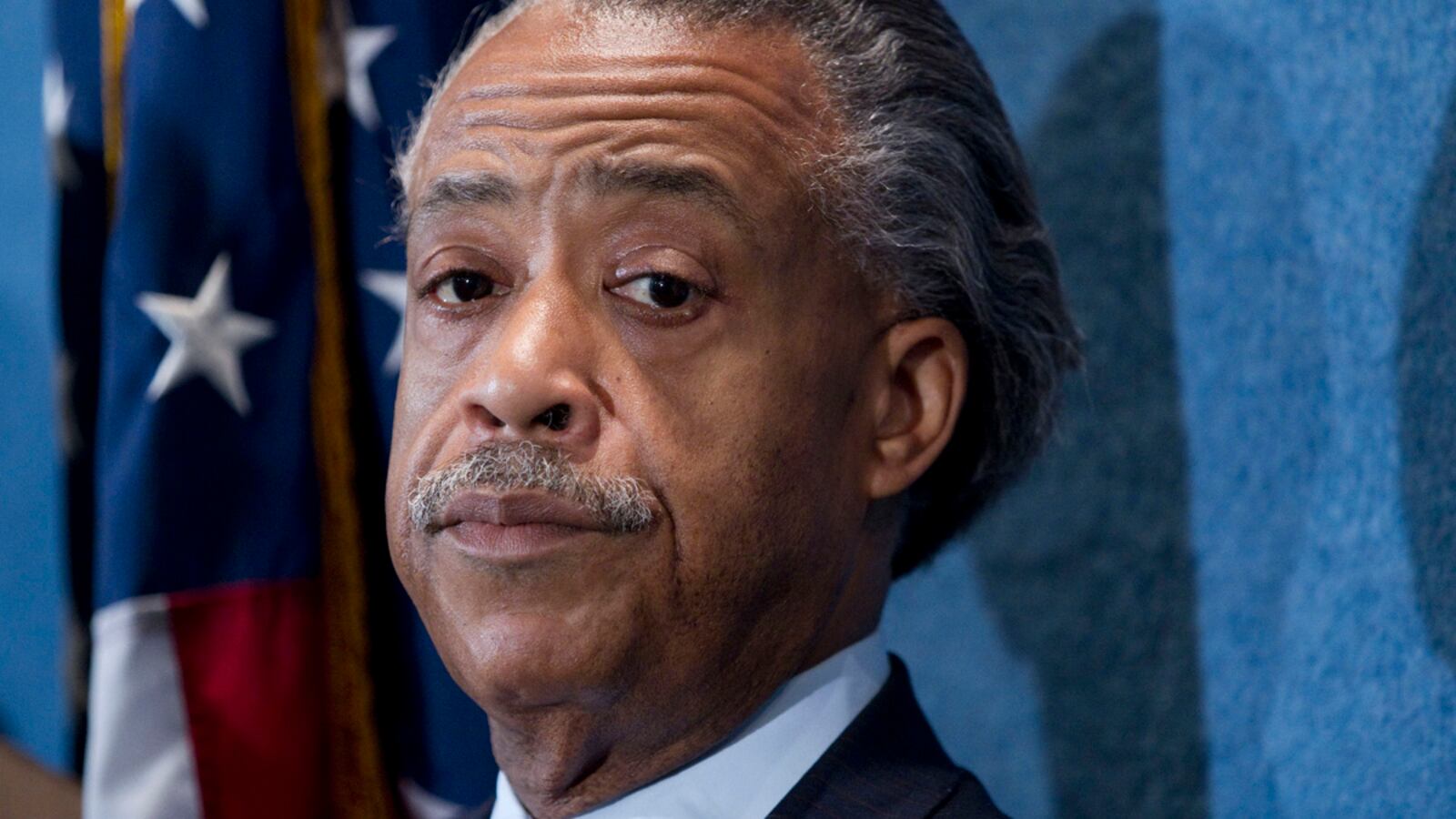Sharpton did his umpteenth “Block the Vote” MSNBC segments Wednesday and Thursday nights about GOP voter-suppression efforts, mocking Republicans once again for their efforts to solve what he calls a nonexistent problem, namely vote fraud. As right as his message may be, there couldn’t be a more flawed messenger. Next, he’ll do a series on GOP racially incendiary rhetoric. Every network has an “Extreme Weather” logo to put up on screen whenever a tornado or hurricane blows through. Sharpton needs an “Extreme Hypocrisy” logo.
Sharpton was visibly incensed over what he derided as the phony exploitation of electoral fraud to justify the new Florida law sponsored by his Wednesday guest, Florida State Rep. Dennis Baxley. The law is so restrictive that it’s forced the League of Women Voters out of the registration business. While no fair observer would challenge Sharpton’s premise that electoral fraud in Florida and elsewhere is an infrequent occurrence, he admitted on the witness stand in 1976 that he’d committed it himself.
And even more tellingly, Sharpton was personally involved in the scam that right-wing outfits like the Heritage Foundation cite as “one of the most egregious examples” of vote fraud ever, the “widespread conspiracy,” as Heritage calls it, to steal thousands of votes between 1968 and 1982 in black Brooklyn. A grand jury report issued by Democratic District Attorney Elizabeth Holtzman in 1984, which is used at the very top of Heritage’s history of vote fraud in America, culminates with a detailed description of the attempted theft of a 1982 congressional election by Sharpton’s then-mentor-and-sidekick Brooklyn state senator Vander Beatty, who went to jail for orchestrating the largest forgery scheme in American politics. Sharpton is alleged to have participated in the scheme.
Yet, on his PoliticsNation show Wednesday, Sharpton repeatedly invoked the 2000 presidential election, charging that Florida officials passed no such restrictive legislation after “hanging chads disrupted this country” during the protracted Bush v. Gore recount. Yet, when the Rev ran for president in 2004, he relied on Roger Stone—the GOP dirty-tricks operative credited with leading the mob that shut down the Florida recount and helped make George Bush president—to virtually run his campaign. Stone installed a longtime aide as Sharpton’s campaign manager, orchestrated the financing effort to qualify for federal matching funds and even allowed the barnstorming Sharpton to use his credit card. The Federal Election Commission ultimately levied one of its largest fines ever against Sharpton’s presidential campaign and required him to return all the improperly obtained matching funds, another testament to his credibility on electoral propriety.

As for Sharpton’s commitment to protecting and expanding the franchise, his 2004 campaign and National Action Network funds were so commingled that grants for NAN voter registration efforts were instead diverted to pay a political consulting firm that did his scheduling on the hustings. And Marjorie Harris, who doubled as Sharpton’s girlfriend and NAN’s executive director, ran its voter registration campaign even though she didn’t bother to register herself until two years after she joined the organization staff (the Board of Elections said, at one point, that it did no work with NAN, making it impossible that the group did any mass registrations in New York).
Lori Minnitte, the Rutgers and formerly Barnard political scientist who testified in Congress on the partisan use of the vote-fraud issue, told The Daily Beast that she’s spent 10 years working on suppression issues, publishing two books and tracking GOP efforts to restrict voting rights, “and I’ve never come across Al Sharpton in any of that.” The same, she said, would apply to Sharpton’s absence from “the counter campaigns to protect voting rights and expand voter registration,” which Minnitte has also studied extensively. That only makes more mysterious the lather he can work himself into whenever he talks about these issues on air today.
I was working for New York State Sen. Major Owens in 1976, when Sharpton tried to run against him in a Democratic primary. Owens had defeated a Brooklyn Democratic-machine candidate two years earlier and, together with a newly elected assemblyman, Al Vann, was a bulwark of a new, independent brand of black politics in the county with the largest Democratic registration in the country. The boss of the Brooklyn party was Meade Esposito, the most powerful county leader in the state whose mob ties and corruption would later result in two federal convictions. Esposito was determined to thwart the growing independence movement on his black flank, and his own top black allies, Councilman Sam Wright and Senator Beatty, would also wind up felons, with Beatty nailed in three separate cases.
My search of registration cards at the Brooklyn Board of Elections revealed that Sharpton had recently registered at three different addresses scattered across the borough. I was in the courtroom when Sharpton testified that he registered at these multiple addresses—a clear violation of the election law—because Carl Butler, Tom Fortune, and Wright, all of whom were black Democratic district leaders loyal to Esposito, couldn’t make up their minds if they wanted to run him against Vann, Owens, or another independent candidate. So, he said, I registered in all their districts. Sharpton was knocked off the ballot and Wright’s cousin was substituted as the candidate against Owens, showing just how tied Sharpton was to the soon-to-be-convicted Wright.
Owens, who wound up serving 32 years in the state Senate and Congress until his 2006 retirement, recalled this episode with a bit of prodding from me today. “I remember Sharpton said in court that Meade was considering him to run in different districts,” said Owens. “It came out that he was working for Meade. And I remember you found the registration cards and came to me about it. It was clear that he was Sam’s candidate.” Owens also recalled Sharpton’s close alliance with Beatty in 1982, when Owens defeated Beatty in a bitter primary for Shirley Chisholm’s seat in the House.
“Beatty showed up with Sharpton at the first debate and they almost started a brawl,” said Owens. “He was there as one of Beatty’s loyal lieutenants. He was there throughout the whole election campaign.” In fact, Beatty’s wife had already been convicted in the 1970s on 52 counts of vote fraud in an election that put the senator on the local school board (one of Beatty’s aides was convicted on 25 counts). In that case, Beatty associates voted from vacant lots and abandoned buildings, with the court finding that 241 of the 309 voters in one district were bogus, the margin that elected Beatty.
Jim Sleeper, a Village Voice reporter who covered the 1982 election, wrote a story in Talking Points Memo in 2008 that recounted the even grosser violations of election laws that occurred at Beatty’s behest in 1982, after Owens won the primary by 2,900 votes. “Beatty’s minions—the young Al Sharpton among them—were actually fabricating ‘evidence’ of voter fraud,” wrote Sleeper, who went to the Brooklyn Board of Elections on Columbus Day weekend in 1982 and discovered 30 Beatty supporters. “They were forging thousands of signatures on voter-registration cards to create enough fraud to invalidate” Owens’s win. As Sleeper first reported it, and as the jury that convicted Beatty later found, Beatty then used his own orchestrated forgeries as proof of so many irregularities that two courts overturned Owens's win (a new election was stopped only the day before it was scheduled to occur when the state’s highest court reversed these decisions).
Sharpton has never disputed Sleeper’s account that he participated in this fraud, nor did he respond when The Daily Beast emailed him this week that we would report about his own use of three registration addresses, as well as the Roger Stone and other electoral oddities of his 2004 presidential race. “We’ll take a pass,” said his spokeswoman, after asking for more detailed descriptions of why I wanted to talk to the Rev.
Brooklyn District Attorney Elizabeth Holtzman, a Democrat, released a grand-jury report in 1984 about the massive voter fraud her office discovered in the Beatty investigation. It went well beyond the belated forgeries designed to overturn the 1982 loss. Without naming anyone, the report described 14 years of “serious and repeated fraud in the electoral process,” contaminating up to 5 different legislative and congressional elections, based on the testimony of witnesses that came forward during the Beatty probe. The report, which is the prime example of vote fraud cited by the right-wing supporters of the restrictive bills Sharpton now regularly denounces, devotes an entire section to the post-election forgeries Sharpton is said to have participated in, revealing that Beatty forgers, at one point, hid in a crawl space over the bathroom until election supervisors went home.
Witnesses are cited in the report as having testified that in addition to the post-election forgeries, “crews of five to eight people” were organized, ostensibly by the Beatty forces, “to vote once” at a variety of different polling sites, “using the names from phony registration cards” that had been created by the thousands over a period of years. One crew chief, who said she’d attended a meeting that included 20 other chiefs, said that her own crew “cast at least 100 votes” for bogus individuals on one primary day, with the other crews doing the same. While there is no evidence that Sharpton participated in any of these pre-election activities, he was a leader in the Beatty army. Beatty was convicted of vote fraud in this case, and racketeering and tax evasion in others, and was murdered in 1990 after he got out of prison.
The use of this 27-year-old report to justify Republican measures to restrict voting opportunities today is transparent politics, but Sharpton’s role in these two scandals makes a dubious champion of the campaign to protect minority and college voters from the GOP assault embodied in these laws. So do the findings against his more recent presidential campaign, and his alliance with Stone, whose artfully staged riot prevented the counting of ballots in Miami-Dade County.
While not nearly as disturbing, Sharpton’s 2008 conduct hardly adds to his credentials as a Let-Every-Vote-Count advocate. He threatened to sue the Democratic National Committee if it attempted to seat any of the convention delegates elected in the Florida and Michigan primaries, actually traveling to Florida to find plaintiffs who’d claim that their decision to skip the primary took legal precedence over the rights of those who went to the polls.
No less than Julian Bond, the legendary civil-rights leader, expressed “great concern” then “at the prospect that millions of voters” from the two primaries, which occurred earlier than the dates set by the DNC, “could ultimately have their votes completely discounted.” While many Obama backers opposed counting the votes in those primaries, which Hillary Clinton won, Sharpton’s threat to go to court was unusual, especially in light of his current “Block the Vote” attacks on Republicans.
Research assistance was provided by Emily Atkin, Matthew DeLuca, Kelly Knaub, Kyle Roerink, and Andy Ross.






